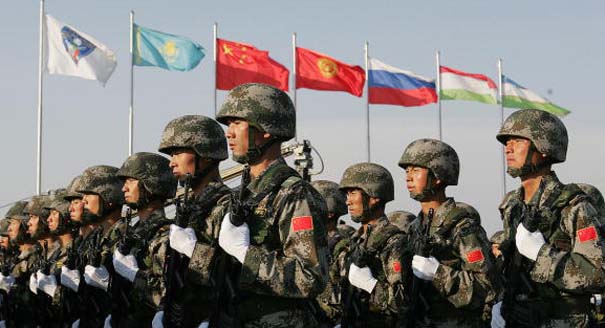Another Shanghai Cooperation Organization (SCO) summit is just around the corner. What can be expected of this meeting that will take place in Bishkek on September 13? With all due respect to the SCO politicians, the answer is: nothing.
The Bishkek summit is special in that it will take place in the atmosphere of heightened international tensions brought on by the Syrian conflict. Barack Obama’s decision to launch a strike against Syria has split the world and is contributing to the growth of anti-American sentiments, which has been promptly exploited by Russia. Moscow anticipates that the summit, which includes both the SCO members states and those that can attend the summit in some other role (for instance, as observer states), will consolidate the organization on an anti-Western basis. In the future, the SCO, whose ranks could be joined by India, Pakistan, Iran, Afghanistan, and possibly some other states, may turn into one of the global political centers of power, which will have to be reckoned with. In fact, this is how the Kremlin officials generally frame the SCO.
However, upon looking at the history of this organization, two totally contradictory images come to mind. The first image is that of a lion ready to spring into action, while the second one is that of a granite monument. Founded back in 2001 as a heir to the Shanghai Five, which in turn had been initiated by China in 1996-1997 to resolve its disputes with neighboring countries, the SCO has so far demonstrated no tangible achievements. Its decisions on economic cooperation, anti-terrorist efforts, and situation in Afghanistan have remained on paper. Reading analytical materials on the SCO reveals countless plans and projects, but provides no information on how these projects have specifically been carried out.
As for Russia, in the SCO it is assigned an unbecoming role of a younger brother, although no one ever mentions it in public. If we are to compare China’s and Russia’s successes in Central Asia, the former will clearly win out. While Russia is painfully constructing the Eurasian Union, China is rapidly consolidating its economic positions. The Central Asian rulers in general are very successful in playing the multi-vector game, which consists of balancing between Beijing, Moscow and Washington, Brussels, and now a host of wealthy Muslim states as well.
Russia’s weakness in this competition of external actors consists in the fact that although it constantly declares that the organizations it is creating—the Customs Union and the Eurasian Union—will pursue purely economic goals, their current and prospective members fear Russia’s political domination. They are afraid of the possibility of a partial restoration of a quasi-Soviet space, which Moscow is cautiously rebranding as “Eurasian.” This scares even such devout Eurasian followers as Kazakhstan. In contrast to being part of the Customs Union, Eurasian Union, or Collective Security Treaty Organization (CSTO), being a member of the China-oriented SCO does not spell loss of sovereignty for the member countries.
The Chinese do not view the SCO as a political instrument and do not wish to turn it into one. Nor do they intend to use it for a standoff with the United States. Evidently, Beijing does not want to push the Syrian issue. While China does share Russia’s views on the conflict in Syria, it prefers not to get deeply involved in it, thus ensuring that it may work with any local regime in the future. All the more so since the possible criticism of the United States at the Bishkek summit will be hot air because the SCO cannot in any way influence the developments in and around that country. Against the background of the verbalized mutual wish of the United States and Russia to come to a consensus, such criticism can in fact remain quite meaningless.
